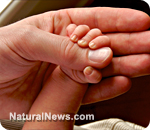
Iron supplementation helps low-birth-weight babies
Monday, December 17, 2012 by: J. D. Heyes
Tags: iron supplementation, low birth weight, babies
- Newly released JFK files reveal Pentagon's role in creating Lyme disease and covid in the same lab
- Trump nominates VACCINE ZEALOT Susan Monarez to lead the CDC, sidelining RFK Jr.'s reform efforts
- Obama accused of laundering USAID funds to fuel global protest movements, regime change operations
- Trump's greatest betrayal so far: Accelerating Middle East wars, silencing dissent, and serving Zionist masters
- STARDUST, a secretive Israeli-US startup, plans risky solar geoengineering experiment to BLOCK OUT THE SUN
- Trump shows his true colors
- $2B Roundup verdict: A landmark blow to Bayer and a win for health freedom
- Outrageous government fraud: $312M in COVID loans went to children as young as 9 months old
- Elon Musk: Aliens could be here on Earth RIGHT NOW
- Festive flavors: The sweet history, nutritional profile and health benefits of pecan pie
- Dr. Mike Yeadon releases 15-minute testimony - WATCH - about genocidal intent of COVID “vaccines”
- HUGE: Putin claims 2020 election fraud in U.S. sparked Ukraine war, calls for peace talks with Trump
- SWEET SABOTAGE: CIA's secret war on Soviet sugar revealed in JFK files
- “Forever chemicals” in drinking water drive alarming cancer surge, new study warns
- California's social media censorship law struck down: A victory for free speech or a threat to online safety?
- Reclaim your health: How midlife exercise reverses years of inactivity
- A mysterious startup is developing a new form of solar geoengineering
- Chris Rufo finally reveals abuse liberals unleashed on his wife and young kids...
- Newly released JFK files reveal Pentagon's role in creating Lyme disease and covid in the same lab
- Elon Musk: Aliens could be here on Earth RIGHT NOW
- Reclaim your health: How midlife exercise reverses years of inactivity
- Trump reverses course on Gaza plan, says “nobody is expelling Palestinians”
- EPA advisor admits the agency is funneling billions to climate groups ahead of Trump’s return to White House
- Big Pharma's $8 Billion bribery scheme exposed: how doctors are pushed to prescribe junk science, not heal
- Space war brewing? Russia threatens to destroy Starlink satellites
- A lack of integrity in Academia: Harvard professor found GUILTY of fraudulent research to promote CRT theory
- Survival 101: Effective EMF blocking techniques
- Rep. Nancy Mace introduces bill to ban biological males from female facilities on federal property
- Mike Adams Sermon 66: God will DESTROY ISRAEL for its wickedness
- Pilots report mysterious lights 'moving at extreme speeds' across Oregon skies
- 5 Simple steps to boost your brainpower: How to strengthen executive function in a distracted world
- Historian warns Israel may be entering an “IRREMEDIABLE DECLINE”
- Florida takes a stand: DeSantis proposes permanent ban on mRNA vaccine mandates
- RFK Jr.'s SSRI antidepressant investigation sparks liberal meltdown, exposes Big Pharma's dangerous game
- OpenAI whistleblower who dissented against how the company trained ChatGPT found dead
- Sugarcane extract superior to cholesterol-lowering drugs?
- EPA advisor admits the agency is funneling billions to climate groups ahead of Trump’s return to White House
- The Health Ranger releases “Vaccine Zombie” song and music video, using AI-animated zombies for the music video
- California's social media censorship law struck down: A victory for free speech or a threat to online safety?
- Dr. Mike Yeadon releases 15-minute testimony - WATCH - about genocidal intent of COVID “vaccines”
- The pandemic as a tool for INDOCTRINATION: Understanding “The Indoctrinated Brain” by Dr. Michael Nehls
- Mike Adams releases country western hit single: Goin’ Back in Time is Comin’ Home
- Mike Adams releases music poetry sensation: A Child of God
- RFK Jr. clears key hurdle: Sen. Susan Collins backs controversial HHS nominee, signaling a new era for health policy
- Florida takes a stand: DeSantis proposes permanent ban on mRNA vaccine mandates
- Unpacking the Lies That We’ve Been Fed – new song and music video released by Mike Adams, the Health Ranger
- Mike Adams releases new song and music video: Nothing More Disgusting Than a Globalist
- Congratulations to the FULLY UNVACCINATED as you resisted the COVID-19 PROPAGANDA MACHINE fueled by over $100 BILLION
- “Why we influenced the 2020 elections”: Facebook files reveal the coordinated effort to bury the Hunter Biden laptop story
- Michigan sheriff announces criminal investigation into 2020 election crimes, Dominion Voting Systems
- Israeli soldiers accused of even more torture and abuse in the West Bank
- Migrants are taking advantage of recent hurricanes to scam residents and loot their homes
- House Intelligence Committee calls for the ARREST and PROSECUTION of Dr. Anthony Fauci
- Peter Rost exposes Big Pharma corruption in his book “The Whistleblower: Confessions of a Healthcare Hitman”
- Red Cross issues warning to stop blood plasma donations from vaccinated people
- Scientists confirm: GENIUS brain function can be spontaneously unleashed in humans without any apparent cause
- EPA advisor admits the agency is funneling billions to climate groups ahead of Trump’s return to White House
- HYSSOP: What research reveals about the health benefits of this ancient holy herb
- Two containers with completed ballots fall out of truck in Florida
- Fully vaccinated about to see “tsunami” of illness and death, warns virologist
- Global leaders unite to clamp down on “misinformation” with UN-backed Cascais Declaration
- BREAKING: 2025 NDAA authorizes mandatory military draft of WOMEN across America… as Pentagon pursues global NUCLEAR war with both Russia and China at the same time
- Michael Yon warns of a ZIONIST TAKEOVER in Trump’s second administration
- BOMBSHELL: DNA testing kits are a SCAM to develop ethnic-specific bioweapons
- Ozempic and Wegovy weight loss drugs are injectable LIZARD VENOM PEPTIDES that may unleash a devastating wave of organ failure… side effects align with symptoms of SNAKE BITES
- Israeli soldiers accused of even more torture and abuse in the West Bank
- These 13 countries just signed an agreement to engineer a global FAMINE by destroying food supply
- NASA admits that climate change occurs because of changes in Earth’s solar orbit, and NOT because of SUVs and fossil fuels
- RFK Jr. clears key hurdle: Sen. Susan Collins backs controversial HHS nominee, signaling a new era for health policy
- Sermon 30: How Jesus reveals Caesar’s FAKE CURRENCY and FALSE AUTHORITY
- Coriander seeds: Ancient medicine backed by modern science
- Arizona officials claim Maricopa County needs 10-13 days to tabulate results of the election
According to scientists from Umea University, the largest in northern Scandinavia, supplemental iron could boost brain development and help prevent behavioral problems in babies who are a little undersized at birth.
Low birth-weight (LBW) babies can be more likely to wind up iron deficient, said the researchers, so they need more of the nutrient to catch up in growth. In addition, they said, LBW babies haven't stored as much iron as other babies not born prematurely.
For these reasons, very early-term and small babies are often placed on supplemental iron. But not as much research has focused on newborns that are just under normal weight to see if they, too, were at risk.
"I think this further solidifies the evidence that it's a very good idea to give these (marginally low birth-weight) children iron supplements," said Dr. Magnus Domellof, who worked on the study.
Decrease in ADHD seen
The research was led by Dr. Staffan Berglund, Domellof's colleague. Their team followed 285 infants born between four pounds, seven ounces and five pounds, eight ounces. The results of the study, titled "Effects of Iron Supplementation on LBW Infants on Cognition and Behavior at 3 Years," were published in the January 2013 issue of the journal Pediatrics.
Researchers randomly assigned the tracked infants to get iron drops - either one or two milligrams per kilogram of body weight - or iron-free placebo drops each day between the ages of six weeks and six months.
"At age three-and-a-half, these infants and 95 who had a normal birth weight were assessed for intelligence and behavior. There were no significant differences in IQ between the low birth weight groups and the normal-weight control group," says a press release from the university.
"However, for behavioral problems like ADHD, there was a significant effect from the iron supplements. Of the low birth weight infants who received no iron supplements, 12.7 percent showed signs of behavior problems, compared to 2.9 percent of infants in the 1-mg group and 2.7 percent of the 2-mg group. In the control group, 3.2 percent of children showed signs of behavioral problems," the release said.
'An ounce of prevention is worth a pound of cure'
The study concluded:
Early iron supplementation of marginally LBW infants does not affect cognitive functions at 3.5 years of age but significantly reduces the prevalence of behavioral problems. The study suggests a causal relation between infant iron deficiency and later behavioral problems.
Researchers said they are continuing to follow the group of children as they grow, "to see if new cognitive or behavioral problems develop or old ones get better as the children head into grade school," Reuters reported.
Domellof said he and fellow researchers did not see any additional gastrointestinal problems in children or delayed growth that could be tied to the use of iron drops. In the past, some research has suggested that giving too much iron to young kids who aren't deficient could actually stunt their development.
Still, "I would not be afraid of recommending this to all children (born) below 2,500 grams (five pounds, eight ounces) at this dose," Domellof told Reuters Health.
"Here's where an ounce of prevention is worth a pound of cure," Dr. Michael Georgieff, a child development researcher at the University of Minnesota in Minneapolis who reviewed the study as part of Berglund's dissertation committee, told the newswire. He said that it is important for all parents to know what their baby's iron requirements are when they leave the hospital after birth.
"The issue with these marginally low birth-weight infants is, people really haven't paid a lot of attention to them, but the evidence is accumulating that they are at risk for behavioral problems and less than ideal cognitive function," added Dr. Betsy Lozoff, who studies the effects of iron deficiency in infants at the University of Michigan in Ann Arbor.
Sources:
http://www.reuters.com
http://pediatrics.aappublications.org
http://www.medfak.umu.se
Iron supplementation at FETCH.news
Get independent news alerts on natural cures, food lab tests, cannabis medicine, science, robotics, drones, privacy and more.
Take Action: Support Natural News by linking to this article from your website
Permalink to this article:
Embed article link: (copy HTML code below):
Reprinting this article:
Non-commercial use OK, cite NaturalNews.com with clickable link.
Follow Natural News on Facebook, Twitter, Google Plus, and Pinterest
Science News & Studies
Medicine News and Information
Food News & Studies
Health News & Studies
Herbs News & Information
Pollution News & Studies
Cancer News & Studies
Climate News & Studies
Survival News & Information
Gear News & Information
News covering technology, stocks, hackers, and more



"Big Tech and mainstream media are constantly trying to silence the independent voices that dare to bring you the truth about toxic food ingredients, dangerous medications and the failed, fraudulent science of the profit-driven medical establishment.
Email is one of the best ways to make sure you stay informed, without the censorship of the tech giants (Google, Apple, Facebook, Twitter, YouTube, etc.). Stay informed and you'll even likely learn information that may help save your own life."
–The Health Ranger, Mike Adams













































